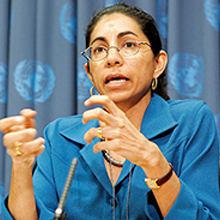
They were not killed during the genocide, but they are now dying of AIDS, so in essence it was a suspended death sentence.Ms. Binaifer Nowrojee, Researcher with Human Rights Watch
⇨ Press Conference Summary
Supporting Survivors
Significant Challenges
The costs of failing to prevent genocide are immense, whether measured in the number of lives lost or the suffering of survivors.
In Rwanda today, thousands of genocide survivors still face significant challenges in their efforts to rebuild their lives, including:
victims of sexual violence orphans widows
... estimated 100,000-250,000 women raped during 3 months of genocide ...
Victims of Sexual Violence
An estimated 100,000-250,000 women were raped during the three months of genocide in Rwanda in 1994.
Rape committed during war is often systematic and intended to terrorize the population, break up families, destroy communities, and, in some instances, change the ethnic make-up of the next generation. Sometimes it is also used to render women from the targeted community incapable of bearing more children.
Sexual violence during war creates multi-fold challenges for survivors:
- The shame and stigma of public rape can often force a rape survivor and her family to flee their community, leaving behind land, property and resources. This often leaves women poorer and more vulnerable to further abuse and in need of financial assistance to get back on their feet.
- The women and their families also face lasting psychological trauma. War typically destroys the very infrastructure needed to help such women, leaving few properly trained counsellors and psychologists. Health centres lack resources and skilled personnel.
- They have medical needs, especially for reconstructive surgeries and may need HIV/AIDS treatment.
- And they want justice – legal redress to ensure that the attackers are caught and punished.
UN in Action — Rwanda: Sexual Violence
(00:04:06)
... more than 1 million orphans in Rwanda and an increasing number are being orphaned as a result of HIV/AIDS ...
Orphans
According to the UN Children’s Fund (UNICEF), there are more than one million orphans in Rwanda. The highest proportion of these were orphaned as a result of the genocide in 1994, however since then, increasing numbers of children are being orphaned as a result of HIV/AIDS.
It is common to see older children raising younger ones by themselves in post-genocide Rwanda today. After the genocide, Rwanda had among the highest proportions of child-headed families in the world — some 42,000 households struggling to raise an estimated 101,000 children.
Many of these children do not go to school or eat regularly. Some, as a result of the widespread rape during the genocide and the increased spread of HIV/AIDs, are now falling ill themselves. Many are at risk of exploitation and abuse. It is a generation that has lost its childhood and whose future is very much at risk.
... thousands of women — both Hutu and Tutsi — widowed in the course of the conflict ...
Widows
Among the survivors of the genocide in Rwanda were thousands of women — both Hutu and Tutsi — who were widowed in the course of the conflict. All traumatized, many had suffered rape, some were infected with HIV/AIDS and many had witnessed the killing of family members.
Since 1994, these women, and organizations that support them, have been fighting to change attitudes towards women in Rwanda and to change laws regarding the property, marital and inheritance rights of women:
- The enforcement of laws upholding their rights
- Medical and counseling services
- Financial support and compensation
- Educational programmes to promote awareness of the value of equal rights for women
Take Action! Get Involved!
Since 1994, many organizations have been established within and outside of Rwanda to support the needs of genocide survivors. The work of such organizations ranges from assisting victims in their quest for justice through the local, national or international judicial processes; providing financial assistance; providing medical and psychological assistance; managing orphanages and employment programmes for youth in Rwanda. You, also, can take action!.

